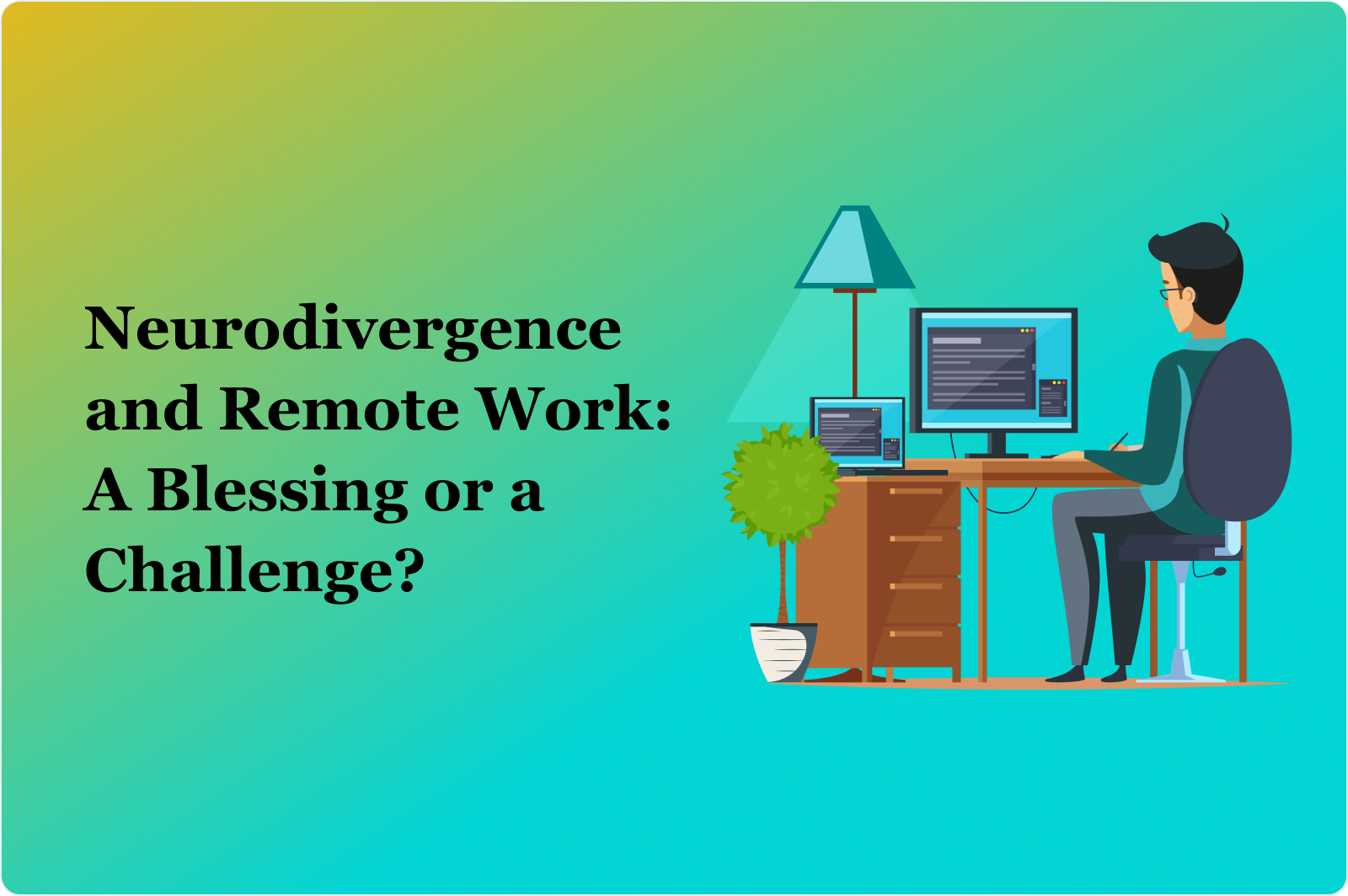

Table Of Content
1. Introduction:
As a neurodivergent career coach, I often speak with individuals who are navigating the complex world of work, particularly when it comes to remote work. Remote work is a significant shift in the professional landscape, and for neurodivergent individuals—those with ADHD, Autism, Dyslexia, or similar conditions—it can present both unique opportunities and challenges. Whether you're someone with neurodivergence or an employer supporting neurodivergent talent, understanding how to manage remote work can make all the difference.
In this blog, we will explore how neurodivergent individuals experience remote work, highlighting the strengths and struggles that come with it, and providing practical tips for managing both the freedoms and frustrations of working from home.
2. Understanding Neurodivergence in the Context of Remote Work
Neurodivergence refers to the idea that certain neurological conditions and variations—such as ADHD, Autism, and Dyslexia—are part of the natural spectrum of human cognition. These conditions often affect how people process information, engage with the world, and interact with others.
In a traditional office setting, neurodivergent individuals may struggle with environmental factors like noise, unpredictable schedules, or social expectations. Remote work, however, offers an alternative that can be more flexible and customizable. But does that make it all sunshine and rainbows? Not exactly. There are both perks and pitfalls to consider, and as a career coach, it's essential to address both sides.
3. ADHD and Remote Work: A Blessing or a Curse?
As someone with ADHD, remote work can feel like a double-edged sword. On the one hand, it offers the freedom to structure your environment, working from a space where distractions can be minimized and tailored to your needs. No more noisy offices or tedious commutes. You can work when your focus is at its peak, often in the comfort of your own home.
However, ADHD often comes with challenges such as time management difficulties, distractibility, and procrastination. While remote work allows for autonomy, it also requires self-discipline, something that can be tough without the external structure of an office environment. The temptation to get sidetracked by household tasks, social media, or simply “switching off” can sometimes be overwhelming.
As a career coach, here are my tips for managing ADHD in remote work:
- Create a routine that works for you: Establish a set schedule, even if it's flexible. Time-blocking, using tools like calendars or to-do lists, and setting up daily rituals can help maintain structure.
- Use productivity tools: Tools like Trello, Asana, or a Pomodoro timer can help break tasks into manageable chunks, keeping you focused and organized.
- Limit distractions: Create a designated workspace to minimize distractions. Noise-cancelling headphones, apps like Freedom (to block distracting sites), or using a clean, quiet space can help keep you on track.
4. Autism and Remote Work: Comfort or Isolation?
For many individuals on the autism spectrum, remote work offers a world of possibilities. The ability to work in an environment of their choosing can reduce the sensory overload often experienced in traditional office settings. They have the freedom to control sensory input like lighting, noise, and even clothing, which can help them perform at their best. Additionally, remote work reduces the need for constant social interaction, which can often be draining.
However, there are also some downsides. Social isolation can be a significant challenge for those with Autism, as working remotely often means less direct interaction with colleagues, limiting networking opportunities and casual conversations. Some individuals may also find that the lack of face-to-face communication creates ambiguity and makes it harder to express their needs.
As a career coach, here’s what I recommend for managing autism in a remote setting:
- Be transparent with your employer: Share your preferences and needs. For example, if you prefer clear, written instructions or less frequent meetings, let your employer know. Open communication is key.
- Set clear boundaries: Without office routines, it’s easy to get lost in work. Schedule breaks, establish “end of day” routines, and maintain a balance between work and personal life.
- Foster virtual connections: While it’s important to manage your social energy, try to schedule regular check-ins with your colleagues or managers to maintain a sense of connection.
5. Dyslexia and Remote Work: Using Technology to Your Advantage
Dyslexia presents unique challenges, especially in traditional work settings where reading, writing, and organizing information are crucial. Remote work, however, can provide a more accommodating environment where digital tools and assistive technologies are readily available.
For example, text-to-speech software, speech-to-text tools, and custom fonts or background colors can help individuals with Dyslexia process written content more effectively. The flexibility of remote work means that you can adjust your environment and use assistive technologies that make reading and writing tasks easier.
However, even with these tools, there are still frustrations. The self-paced nature of remote work may mean that some individuals with Dyslexia may feel overwhelmed without support or structure, especially when managing large volumes of reading or writing tasks.
Here are some tips I provide to individuals with Dyslexia for remote work:
- Leverage technology: Use tools like Grammarly, Read&Write, or Microsoft’s Immersive Reader to assist with writing and reading tasks. There are also plenty of apps that can read text aloud, helping you avoid the strain of reading lengthy documents.
- Prioritize visual aids: Mind maps, charts, or color-coded notes can help organize thoughts and break down complex information into manageable chunks.
- Break tasks into smaller steps: If you’re tackling a big project, break it down into smaller, more digestible tasks. Set achievable goals and pace yourself throughout the day.
6. How Employers Can Support Neurodivergent Employees
As a career coach, I know that employers play a critical role in the success of neurodivergent talent. Remote work, while offering flexibility, also requires a supportive and inclusive work culture. Employers can help neurodivergent employees thrive by implementing a few key strategies.
- Offer flexibility and understanding: Each neurodivergent individual works differently. Flexible schedules, the ability to work asynchronously, and an understanding attitude go a long way in fostering a supportive environment.
- Provide the right tools: Ensure employees have access to assistive technologies and tools that support their specific needs, from text-to-speech software to productivity apps.
- Encourage open communication: Create an environment where neurodivergent employees feel comfortable discussing their needs, whether it's in terms of work hours, communication preferences, or workspace accommodations.
- Foster inclusivity: Establish a workplace culture where neurodiversity is embraced, and employees are encouraged to bring their authentic selves to work.
7. Conclusion
Remote work can be both a blessing and a challenge for neurodivergent individuals. It provides flexibility and the ability to tailor one’s environment, but it also demands self-management, discipline, and the right tools. With the right strategies, neurodivergent individuals can thrive in remote work, leveraging their unique strengths and overcoming challenges. Employers, on the other hand, must create an environment that is inclusive and flexible, understanding that neurodivergent employees have unique ways of working and communicating.
As a neurodivergent career coach, I am committed to supporting individuals in navigating these challenges and opportunities. By creating the right balance of structure, support, and flexibility, remote work can be a positive and fulfilling experience for everyone.

